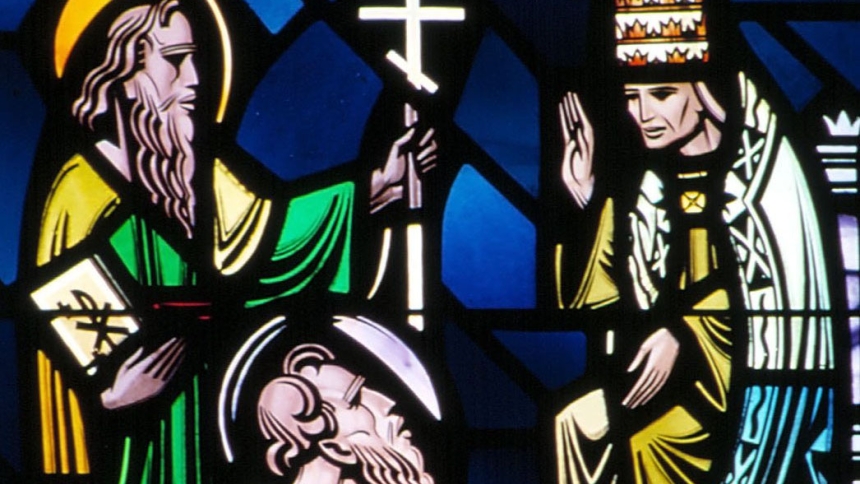
(OSV News) - On Feb. 14, Christians and non-Christians alike remember St. Valentine, a priest who suffered a martyr's death in Rome.
And it is fitting to do so, for he is among the saints of the day in the 2004 edition of the Roman Martyrology, the most recent edition of the church's official listing of the saints -- who are honored throughout the universal church -- and the blesseds, whose liturgical veneration is permitted in certain places following beatification.
Not as widely known in the United States as St. Valentine are two other saints at the top of the list on Feb. 14, and recent popes have repeatedly sought to draw greater attention to them. Pope Leo XIII (1880) and St. John Paul II (1985) devoted encyclicals to them; Pope Pius XI (1927), St. John XXIII (1963), St. Paul VI (1969) and Pope Francis (2013) wrote letters about them; and Pope Benedict XVI (2009) devoted a Wednesday general audience to them. In 1980, St. John Paul declared them co-patrons of Europe.
Their names are Constantine and Michael, two Greek brothers better known as Cyril and Methodius, the names they took upon becoming monks. In evangelizing the Slavs, they changed the course of history.
Methodius was born around 815 in the Greek city of Thessaloniki, the second most important city of the Byzantine Empire. Following in the footsteps of his father, who was an important government official, he became a leading provincial administrator in northeastern Greece, an area that had a significant Slavic population. He abandoned his career, however, to become a monk in what is now northwestern Turkey, and later he became an abbot.
Cyril, the youngest of Methodius' six siblings, was born around 827. Educated in Constantinople, the capital of the Byzantine Empire, he became known for his high intelligence. When a professor attempted to arrange a marriage to a prominent woman, Cyril demurred. He also decided not to embark on a political career.
Instead, he was ordained to the priesthood, became librarian at the famed church of Hagia Sophia, and was appointed secretary to the patriarch of Constantinople, two centuries before the Great Schism between East and West.
In time, Cyril, too, became attracted to the monastic life and slipped out of Constantinople to pray at a monastery.
Six months later, he was found; he returned to the imperial capital to teach and became known as "the philosopher." The emperor and the patriarch later sent Cyril, who had great linguistic gifts, on a diplomatic mission to the caliph of Baghdad, the most prominent Muslim ruler of the day.
Eventually, Cyril was able to join his brother at his monastery.
There they might have remained for the rest of their lives if the emperor had not sent Cyril, joined by Methodius, on a mission to the Khazars on the northern edge of the Black Sea around 861.
During their mission, they discovered the relics of St. Clement I, the fourth pope, who had been exiled to the region at the end of the first century and had died a martyr.
During Cyril and Methodius' childhood, Great Moravia, a territory that included the modern Czech Republic and Slovakia, had been evangelized by Franco-German clergy. Three decades after this initial evangelization, Duke Rastislav of Great Moravia wrote to the Byzantine emperor that "since our people rejected paganism, they have embraced the Christian law; but we do not have a teacher who can explain the true faith to us in our own language." In response, the emperor sent Cyril and Methodius, who had returned from their mission to the Khazars.
They arrived around 863 and translated the Bible and liturgical texts into the people's language, Old Slavonic, with Cyril devising its alphabet.
"It was a crucial event for the development of the Slav civilization in general," Pope Benedict XVI said in 2009. "Cyril and Methodius were convinced that the individual peoples could not claim to have received the Revelation fully unless they had heard it in their own language and read it in the characters proper to their own alphabet."
The brothers' decision to celebrate the liturgy in Old Slavonic provoked opposition, and they traveled to Rome to defend themselves. Stopping in Venice, they debated churchmen who believed that the liturgy should only be celebrated in Hebrew, Latin or Greek.
Bearing St. Clement's relics, they arrived in Rome and met Pope Adrian II, who approved their mission and the translation of the liturgy into Old Slavonic.
Cyril soon became ill, entered a monastery in Rome and died Feb. 14, 869.
Methodius, now an archbishop and papal legate to the Slavs, traveled to Great Moravia and Pannonia, which included portions of Hungary, Austria and several Balkan nations. Again facing opposition from Franco-German political and church leaders, he was imprisoned for two years and released in 873 at the intervention of Pope John VIII, Pope Adrian's successor.
Back in Great Moravia, Rastislav's successor, Svatopluk I, opposed Methodius' mission and spread rumors against him. Called to Rome in 880, Methodius defended himself, and Pope John ruled in his favor. Methodius then returned to Constantinople and "devoted the last years of his life principally to making further translations of the Sacred Scriptures, the liturgical books, the works of the Fathers of the Church and also the collection of ecclesiastical and Byzantine civil laws called the Nomocanon," St. John Paul wrote in 1985.
Methodius also trained clergy who would continue his apostolate, and he died in Velehrad, a village in the Czech Republic, April 6, 885.
Methodius' disciples faced intense opposition: Pope Benedict recalled that they were "persecuted and imprisoned; some of them were sold as slaves and taken to Venice where they were redeemed by a Constantinopolitan official." Following their release, they went to Bulgaria, and five of them -- Clement of Ohrid, Gorazd, Naum, Sabas and Angelarius -- are recognized as saints.
In time, the apostolate launched by Sts. Cyril and Methodius would reach other Slavic peoples as well, from the Balkans to Russia.
"Cyril and Methodius are in fact a classic example of what today is meant by the term 'inculturation': every people must integrate the message revealed into its own culture and express its saving truth in its own language," Pope Benedict observed. "The two holy brothers have left us a most important testimony of this."
J.J. Ziegler, who holds degrees in classics and sacred theology, writes from North Carolina.


